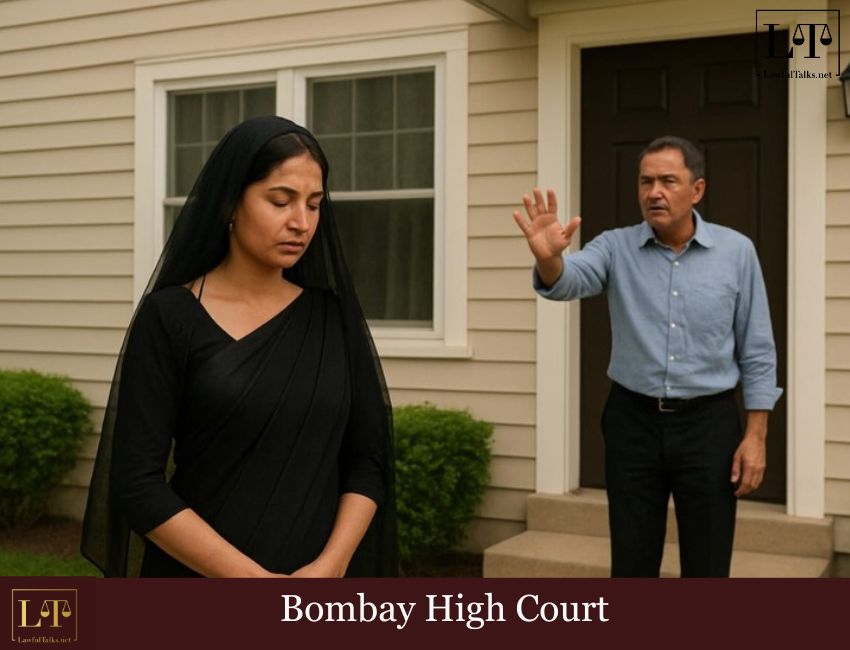Allahabad HC Sets Aside Afzal Ansari's Conviction, Allows Him to Continue as MP

In a pivotal judgment , Justice Urmila Joshi-Phalke of the Bombay High Court’s Nagpur Bench, partly allowed a criminal revision application holding that refusing a woman the right to live in her shared household amounts to domestic violence under the Protection of Women from Domestic Violence Act, 2005.

FACTS :
The applicant before the High Court is the brother of the deceased husband of the first non-applicant. The first non-applicant married Mukesh Chauhan, the brother of the applicant, and the second non-applicant is their minor son.
On 23.5.2008, Mukesh died and since then the nonapplicants tried to pursue a request for permitting them to reside in the house. As per the allegations, the applicant did not allow them to stay in the house. The mother-in-law of the non-applicant No.1(mother of the applicant) executed a Will on 29.9.2004 and bequeathed the ground floor to the applicant and first floor to the deceased Mukesh.
The mother of the applicant also died on 5.2.2007. The couple initially lived in the shared household at Nagpur, then moved to Pune in 2004, following a family dispute and later shifted to a rented premises.
When Mukesh died in 2008 the construction of the first floor of the family house was still incomplete. After Mukesh’s death, the widow sought to return to the shared household with her son but was denied entry by the applicant and had to live in rented accommodation, paying ₹6,000 per month.
She eventually moved the Judicial Magistrate First Class under Section 12 of the Protection of Women from Domestic Violence Act, 2005, seeking residence and alleging domestic violence.
The applicant resisted her claim, contending that she had not lived in the house with her husband after 2004, that a divorce deed had been executed in 2007, and that the Act could not apply as it came into force only in 2005.
Judgment
The court examined the statutory definitions under the Act, including “aggrieved person” [Section 2(a)], “domestic relationship” [Section 2(f)] and “shared household” [Section 2(s)], and held that these provisions cover women who “have, at any point of time, lived together” in a domestic relationship.
The Court asserted that none of the definitions require the domestic relationship to subsist on the date of the application. Past cohabitation is enough to invoke the Act.
The High Court also noted that under Section 17 every woman in a domestic relationship has the right to reside in the shared household, whether or not she has any title, right or beneficial interest in it, and cannot be evicted except in accordance with law.
The expression “right to reside in the shared household,” the Court observed, is not restricted to actual residence; it can be enforced even when the woman is not currently living in the property.
Addressing the applicant’s defence of a divorce deed, the Court pointed out that dissolution of marriage requires a decree from a competent civil court under Section 13 of the Hindu Marriage Act and cannot be achieved merely by executing a deed.
Most crucially, the Court held that preventing the first non-applicant from accessing the shared household amounted to economic abuse and therefore domestic violence under Section 3 of the Act.
It expressly recorded:“it provides that economic abuse would be domestic violence if the respondent prohibits or restricts the applicant to continue access or resources or facilities which aggrieved person is entitled to use or enjoy by virtue of the domestic relationship including the access to the shared household. Therefore, in view of the rights given under the said Act, the provisions of the shared household and domestic relationship between the applicant and the non-applicants may not be there. However, considering the non-applicant No.1 was deprived from using the shared household property and, therefore, the applicant has committed the domestic violence who was in the year 2004 in a domestic relationship with her. Therefore, the judgment and order passed by learned Additional Sessions Judge calls no interference. Only modification required is that instead of ground floor, the non applicant No.1 is entitled to reside in the shared household on the first floor in view of recital of the Will executed by her mother-in-law.”
Accordingly, while the High Court upheld the right of residence granted by the appellate court, it modified the order to align with the Will and directed that the widow and her son be accommodated on the first floor instead of the ground floor. The rest of the appellate order was maintained.
Case Title: Ashish Chandrakant Chauhan v. Mohini Mukesh Chauhan & Anr. [Criminal Revision Application No. 240 of 2022]

Het Dedhia
3rd Year Law Student from SVKM's Pravin Gandhi College of Law
Latest Posts
Categories
- International News 19 Posts
- Supreme Court 336 Posts
- High Courts 352 Posts






























































































































































































































































































































































































































































































































































































































































































































